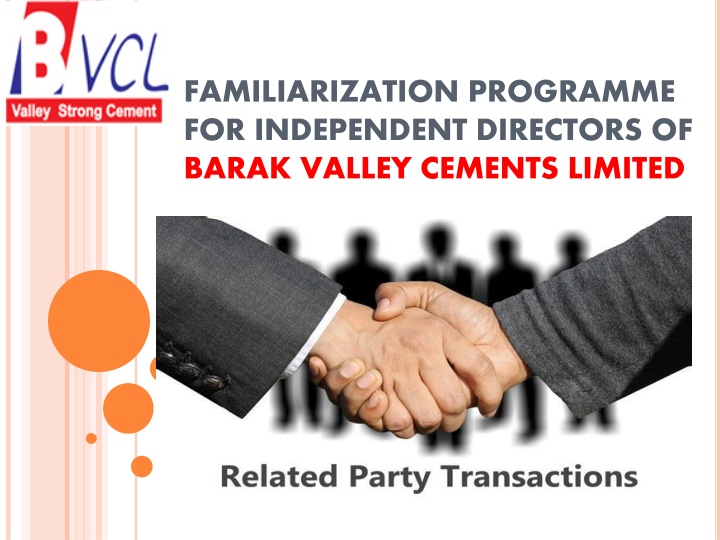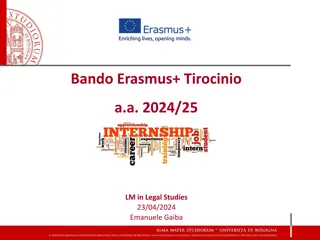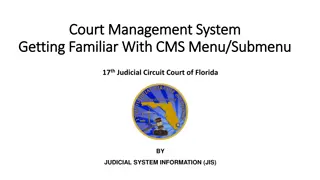
Related Party Transactions in Business Operations
Explore the significance of familiarization programs for independent directors of Barak Valley Cements Limited. Gain insights into related party transactions under Section 188 of the Companies Act, 2013, highlighting the definition of related parties and the need for internal controls to prevent abusive transactions.
Download Presentation

Please find below an Image/Link to download the presentation.
The content on the website is provided AS IS for your information and personal use only. It may not be sold, licensed, or shared on other websites without obtaining consent from the author. If you encounter any issues during the download, it is possible that the publisher has removed the file from their server.
You are allowed to download the files provided on this website for personal or commercial use, subject to the condition that they are used lawfully. All files are the property of their respective owners.
The content on the website is provided AS IS for your information and personal use only. It may not be sold, licensed, or shared on other websites without obtaining consent from the author.
E N D
Presentation Transcript
FAMILIARIZATION PROGRAMME FOR INDEPENDENT DIRECTORS OF BARAK VALLEY CEMENTS LIMITED
RELATED PARTY TRANSACTIONS AS PER SECTION 188 OF THE COMPANIES ACT, 2013 AND SEBI(LODR) Any contract or arrangement entered into with a related party is treated as a related party transaction under the Companies Act, 2013. The Ministry of Corporate Affairs and SEBI allows related party transactions to enter into the normal course of business at a price that is applicable to other parties. However, transactions not at arm s length price require approval of the audit committee, board, and shareholders approval. Therefore, it becomes essential to have internal controls within an organization to prevent abusive related party transactions and establish a robust mechanism of approvals and disclosures.
MEANING OF RELATED PARTY As per Section 2(76) of the Companies Act, 2013 With reference to any company, the following shall be the related party: A director or his relative; Key managerial personnel or his relative; Any firm: In which a director, manager, or relative is a partner; Private company: In which a director or manager or his relative is a member or director
Public Company in which a director or manager: Is a director or Holds, along with his relatives, more than 2% of the paid-up share capital of the company. Any body corporate whose board of directors, managing director, or manager is accustomed to acting in accordance with the advice, directions, or instructions (except those given in a professional capacity) of a director or manager; Any person on whose advice, directions, or instructions (except those given in a professional capacity) a director or manager is accustomed to act. A holding, subsidiary, or an associate company; or
Another company. For E.g. A limited is a holding company of B Limited and C Limited. In that case, B Limited and C limited will be related parties. subsidiary Company of the holding Any body corporate who has invested in a company i.e. an investing company or the venture company. Prescribed person i.e. a director other than an independent director or key managerial personnel of the holding company or his relative with reference to a company, shall be deemed to be a related party.
RELATED PARTY TRANSACTIONS As per Section 188 of the Companies Act, 2013, the following transactions are categorized as related party transactions when entered into with a related party by any company Sale, purchase, or supply of any goods or materials; Selling or otherwise disposing of, or buying, property of any kind; Leasing of property of any kind; Availing or rendering of any services; Appointment of any agent for purchase or sale of goods, materials, services, or property; Such related party s appointment to any office or place of profit in the company, its subsidiary company, or associate company; and Underwriting the subscription of any securities or derivatives thereof, of the company.
DISCLOSURES FOR RELATED PARTY TRANSACTION (i) Disclosures for related party transactions in Board s report Every contract or arrangement entered into by the company shall be referred to in the Board s report to the shareholders along with the justification for entering into such contract or arrangement. The particulars of related party transactions which are not on an arm s length price and material- related party transactions which are on arm s length price will be reported in AOC-2.
(ii) Disclosures for related party transactions In the register of contracts or arrangements Every company is required to record details of related party transactions in the register in Form MBP-4. (iii) Disclosures for transactions to stock exchanges for listed companies related party A listed entity is required to disclose details of related party transactions on a consolidated basis in a prescribed format, to the stock exchanges, and on its website, on the date of publication of the standalone and consolidated financial results for the half year.
(iv) Disclosures for related party transactions in the Annual Report for listed companies A listed company is required to make the disclosures for related party transactions in an annual report in the corporate governance section.
SEBI (LISTINGOBLIGATIONSAND DISCLOSUREREQUIREMENTS) REGULATIONS, 2015 Under SEBI, a transaction with the related party will be considered as material if transactions entered into individually or taken together with previous transactions during a financial year exceeds, lower of the followings: INR 1000 Crores or 10% of consolidated turnover of the listed entity as per the last audited financial statements
Further, a transaction involving payments made to a related to brand usage or royalty shall be considered material if the transaction(s) to be entered into individually or taken together with previous transactions during a financial year, exceed 5% of the annual consolidated the listed entity as per the last audited financial statements of the listed entity. party with respect turnover of
VIOLATIONOFSECTION 188 Any director or any other employee of a company, who had entered into or authorised the contract or arrangement in violation of the provisions of this section shall, i. in case of listed company, be liable to a penalty of twenty-five lakh rupees and ii. in case of any other company, be liable to a penalty of five lakh rupees






















